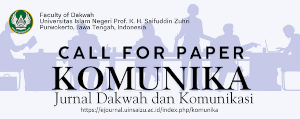ETIKA JURNALISTIK PERSPEKTIF AL-QUR’AN
DOI:
https://doi.org/10.24090/komunika.v7i1.373Keywords:
Journalistic ethic, al-Qur’anAbstract
Today, journalistic world increasingly find its freedom. Its effects can nolonger be taken lightly. Therefore, there should be some rules to control and tocommand the journalists, not to restrict it. Related to this issue, the normativesources of Islam, the Qur'an encourage people to speak the truth, honestly and inaccordance with the facts (QS. al-Ahzab [33]: 70). In another verse, Allah alsoorders to stay away from the prejudice that would bring doubt and untruth (QS. al-Hujurat [49]: 12), nor slander broadcast news in various forms (QS. al-Nur [24]:19) and the reader should check the truth first before receive it (QS. al-Hujurat[49]: 6). Some of these verses are references to the news makers or journalist intheir work, as well as for the consumers when they receive the news.At this paper, the dialogue between the Qur'an with the phenomenon ofjournalism displayed by using the comparative nature of the interconnectionpattern (in this case the journalistic ethics of the Press Council and the decision ofthe Indonesian Broadcasting Commission and journalistic ethics in the Qur'an).About exegesis of the Qur'an, the method is used is ijmali and it did not interpretall of the content of verse, only partly related to the news.Downloads
Download data is not yet available.
Downloads
Issue
Section
Articles
License
Authors who publish with this journal agree to the following terms:
- Authors retain copyright and grant the journal right of first publication with the work simultaneously licensed under a Creative Commons Attribution-ShareAlike 4.0 International License that allows others to share the work with an acknowledgement of the work's authorship and initial publication in this journal.
- Authors are able to enter into separate, additional contractual arrangements for the non-exclusive distribution of the journal's published version of the work (e.g., post it to an institutional repository or publish it in a book), with an acknowledgement of its initial publication in this journal.
- Authors are permitted and encouraged to post their work online (e.g., in institutional repositories or on their website) prior to and during the submission process, as it can lead to productive exchanges, as well as earlier and greater citation of published work (See The Effect of Open Access).
























